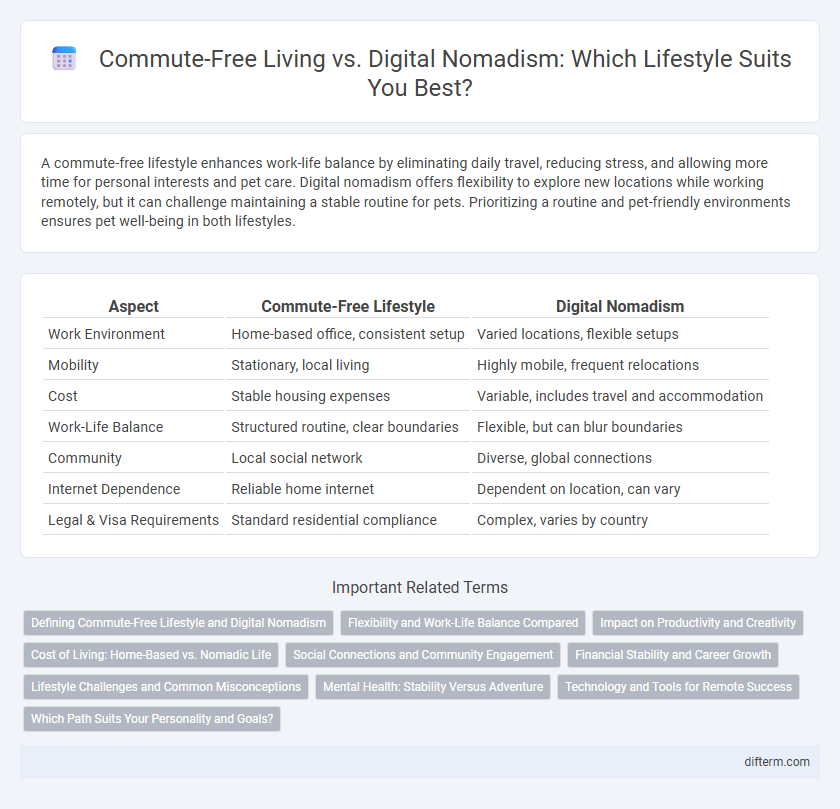A commute-free lifestyle enhances work-life balance by eliminating daily travel, reducing stress, and allowing more time for personal interests and pet care. Digital nomadism offers flexibility to explore new locations while working remotely, but it can challenge maintaining a stable routine for pets. Prioritizing a routine and pet-friendly environments ensures pet well-being in both lifestyles.
Table of Comparison
| Aspect | Commute-Free Lifestyle | Digital Nomadism |
|---|---|---|
| Work Environment | Home-based office, consistent setup | Varied locations, flexible setups |
| Mobility | Stationary, local living | Highly mobile, frequent relocations |
| Cost | Stable housing expenses | Variable, includes travel and accommodation |
| Work-Life Balance | Structured routine, clear boundaries | Flexible, but can blur boundaries |
| Community | Local social network | Diverse, global connections |
| Internet Dependence | Reliable home internet | Dependent on location, can vary |
| Legal & Visa Requirements | Standard residential compliance | Complex, varies by country |
Defining Commute-Free Lifestyle and Digital Nomadism
A commute-free lifestyle eliminates daily travel to a physical workplace by enabling remote work, enhancing work-life balance and reducing stress from traffic congestion. Digital nomadism combines remote work with travel, allowing individuals to work from various global locations while leveraging digital tools for communication and productivity. Both lifestyles prioritize flexibility and autonomy but differ in location stability, with commute-free workers typically rooted in one place and digital nomads constantly mobile.
Flexibility and Work-Life Balance Compared
A commute-free lifestyle offers enhanced daily flexibility by eliminating travel time, allowing for better integration of personal and professional activities within a stable home environment. Digital nomadism provides unparalleled geographic freedom, enabling remote work from various global locations, which can enrich cultural experiences but may challenge consistent work-life boundaries. Both lifestyles promote improved work-life balance, yet commute-free living tends to facilitate routine stability, while digital nomadism prioritizes adaptability and exploration.
Impact on Productivity and Creativity
A commute-free lifestyle significantly boosts productivity by eliminating travel time, allowing more consistent focus and structured work hours. Digital nomadism enhances creativity through exposure to diverse environments and cultures, fostering innovative thinking and problem-solving. Both lifestyles offer unique benefits, with commute-free routines supporting efficiency and digital nomadism stimulating creative inspiration.
Cost of Living: Home-Based vs. Nomadic Life
Home-based lifestyles typically incur lower and more predictable living costs due to fixed housing and utility expenses, offering stability in budgeting. Digital nomadism can lead to variable costs influenced by travel, accommodations, and fluctuating local prices, which may increase overall expenses. Evaluating cost of living involves comparing fixed monthly payments against dynamic, location-dependent spending patterns to determine financial sustainability.
Social Connections and Community Engagement
A commute-free lifestyle fosters deeper local social connections by allowing more consistent interactions within a stable community, enhancing a sense of belonging and support. In contrast, digital nomadism offers diverse, global networking opportunities but often results in transient relationships with limited long-term community engagement. Prioritizing a commute-free life can lead to stronger, more meaningful communal ties and sustained social involvement.
Financial Stability and Career Growth
Commute-free lifestyles offer financial stability through reduced transportation costs and the ability to maintain consistent work hours, fostering steady career growth within established roles. Digital nomadism provides flexibility and global networking opportunities but often comes with variable income streams and less predictable career advancement. Balancing remote work stability and nomadic adaptability is key for maximizing financial security and professional development.
Lifestyle Challenges and Common Misconceptions
A commute-free lifestyle often faces challenges such as maintaining work-life balance and avoiding social isolation, while digital nomadism requires managing unstable internet connectivity and navigating visa restrictions. Common misconceptions include the belief that a commute-free lifestyle guarantees increased productivity and that digital nomads enjoy constant leisure without financial insecurity. Both lifestyles demand strong self-discipline, adaptability, and realistic expectations to thrive amidst these challenges.
Mental Health: Stability Versus Adventure
A commute-free lifestyle offers mental health stability by reducing daily stressors and fostering consistent routines that promote well-being. In contrast, digital nomadism enhances cognitive flexibility and emotional resilience through constant change and novel experiences, which can reduce burnout but may challenge long-term stability. Balancing the comfort of a stable environment with the invigorating effects of adventure is crucial for optimizing mental health in modern work lifestyles.
Technology and Tools for Remote Success
Advanced collaboration platforms like Slack, Zoom, and Trello empower both commute-free professionals and digital nomads to maintain seamless communication and project management regardless of location. Cloud storage solutions such as Google Drive and Dropbox ensure real-time file access and synchronization, enhancing productivity across diverse environments. Robust cybersecurity tools, including VPNs and multi-factor authentication, safeguard sensitive data while supporting flexible work models in increasingly digital landscapes.
Which Path Suits Your Personality and Goals?
A commute-free lifestyle offers stability and work-life balance by eliminating daily travel, ideal for individuals prioritizing routine and local community engagement. Digital nomadism suits adventurous personalities who value flexibility, cultural immersion, and remote work opportunities across global destinations. Understanding your priorities in structure versus freedom helps determine whether a stationary lifestyle or continuous mobility aligns better with your personal and professional goals.
Commute-Free Lifestyle vs Digital Nomadism Infographic

 difterm.com
difterm.com